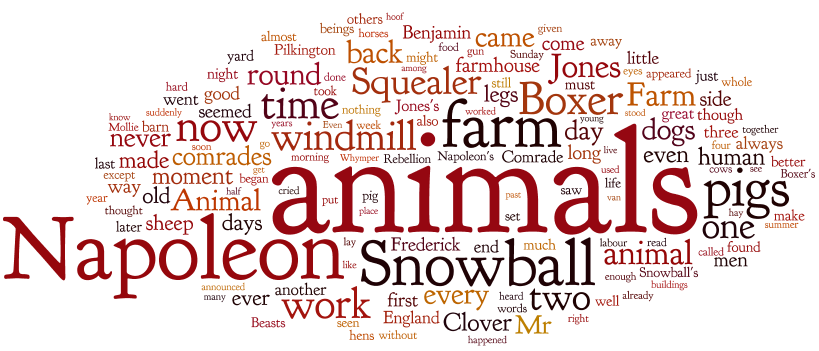Animal Farm: An Essay
Animal
Farm is a satirical fable by George Orwell. In this book, animals on a farm rebel against
their human masters and start running the farm themselves. Unfortunately, the
pigs who become the new leaders of the farm are corrupted by power and become as
or more unfair and self-serving than the humans. The story is an allegory of Stalin’s
Soviet Union, the communist dictatorship that eventually developed from the
destruction of Tsarist Russia. In Animal Farm, the character of Napoleon
is a manipulative leader, and the character of Boxer is a blindly trusting
follower; both of their behaviors lead to the loss of freedom and equality on
Animal Farm.
Napoleon,
who represents Josef Stalin, is one of the pigs who immediately seizes power
after The Rebellion and eventually becomes the totalitarian leader of Animal
Farm. His manipulation of history and rules leads to the loss of freedom and
equality on Animal Farm. Napoleon manipulates history by revising it for his
own benefit. Also, he alters the Seven Commandments, which were established
before the Rebellion, so that his misdemeanors will be in accord with the
principles of Animalism, Animal Farm’s system of thought. In addition, Napoleon
lionizes the leader and later outcast, Snowball (who represents Leon Trotsky),
as a malevolent figure to keep the other animals in fear, thus making them see
Napoleon as a protective figure and their defender against Snowball. As a
result of Napoleon’s manipulation, the other animals on Animal Farm believe
that he is a good leader and are blinded to the many transgressions he commits.
Boxer,
who represents the Russian working class, is an industrious, somewhat dimwitted
horse who is one of Napoleon’s most faithful followers. His blind trust in
Napoleon also contributes to the loss of freedom and equality on Animal Farm.
Boxer’s repetition of the maxim, “Napoleon is always right,” is one example of
his unwavering loyalty. His undaunted faith further reveals itself in his
constant determination to work harder, such as his resolution to carry more and
more loads of stone for the windmill that the animals build, and his conviction
that hard labor is the solution to all the farm’s problems. As a result of
Boxer’s blind trust, conditions on Animal Farm continue to steadily deteriorate,
as his gullibility leads him time and again to work feverishly against his own
interests and those of the other animals.
In
Animal Farm, both Napoleon, the leader, and Boxer, the follower, act in
ways that erode the basic liberties of the animals. Napoleon manipulatively uses
Boxer’s naiveté to achieve his own selfish ends, demonstrating how power
corrupts, and absolute power corrupts absolutely. Orwell’s story shows that communism, while attractive
in theory, does not stand up to its’ original ideals in the real world due to
human (or, in this case, animal) flaws. The leaders of a communist government
often follow closely in the footsteps of the leaders who they have overthrown,
as is simply but ingeniously illustrated in Orwell’s quote; “The creatures
outside looked from pig to man, and from man to pig, and from pig to man again;
but already it was impossible to say which was which.” On the surface, Animal
Farm appears to be a simple fable, but ultimately it seeks to reveal fundamental
truths about human nature.
I got the image from: http://www.irisreading.com/one-book-one-day/day-130-animal-farm-by-george-orwell-speed-reading-it-at-500-wpm/
I got the image from: http://www.irisreading.com/one-book-one-day/day-130-animal-farm-by-george-orwell-speed-reading-it-at-500-wpm/

No comments:
Post a Comment